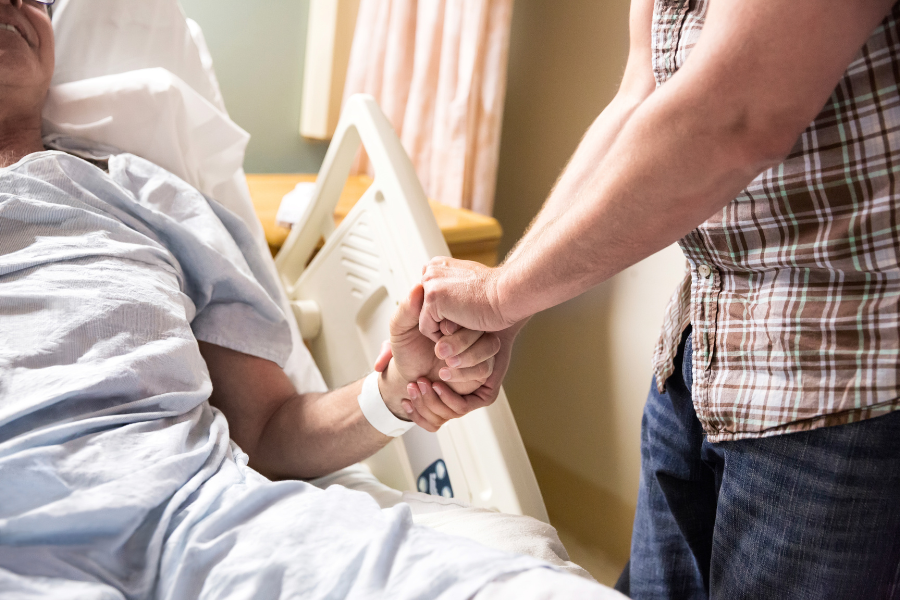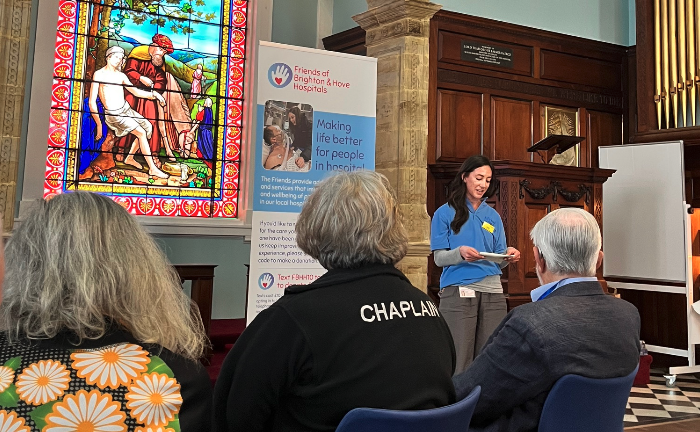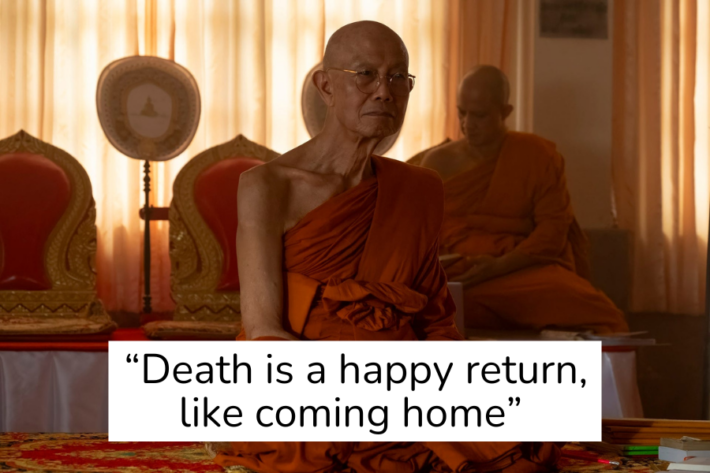How to talk to a dying friend

“Over the weekend I was scrolling through Twitter and came across this beautiful post from our friend, eminent Palliative Care Consultant and bestselling Author, Dr Kathryn Mannix. She has kindly given us permission to share it with you. I hope you find it as moving and profound as I did.”
Liz Pryor MBE, Founder & CEO
Kathryn said….
“I recently received a request for advice about how to talk to a dying friend. The thread from 2020 below seems appropriate:
What death looks like
Most of us haven’t seen somebody die in real life. We get our inner pictures from TV dramas, cinema screens, media stories. We’ve had more of those media stories than usual during the Covid19 pandemic. But we haven’t been there for real.
Worse: for some of us, our beloved person died, and we weren’t allowed to be there. We have pictures in our minds of how it might have been, but no way of knowing for sure.
Some of us work in health and social care. We’re more likely to have been alongside dying people. But unless we recognise the process, then we may not understand what we’re witnessing.
Some experienced workers aren’t aware that there are similarities between most deaths.
Understanding the process
Understanding the process of dying lets us advise the companions: we can tell beloveds to look/listen out for signs that help them to know their loved one is ‘dying safely’, or when to summon help because their loved one is unnecessarily distressed. We need to know this.
Until we’ve been at the beside of a person we love, our own beloved person instead of a patients or a resident in our care; until we have applied what we know about the process of dying to the death of a person we love deeply, we can’t really understand accompaniment.
Until we’ve been that family, despite our clinical knowledge we can’t really understand the experience at those bedsides, of families (whether related by kinship or by choice) who are accompanying their beloved to their final breath. I discovered this by being there myself.
So I want to say this about deathbeds.
Deathbeds
They are inevitable. The day will come for all of us. For a few it won’t be a bed, but perhaps a car or a park bench. But for most of us, death will approach gradually, and we will have a change to recognise and reflect on the situation.
A lifetime among dying people has taught me some helpful things. First, although no-one usually feels keen about dying, those on their deathbeds are often more concerned about their beloveds than about themselves.
They have things to say. And we can help by listening.
Listen
If they want to say sorry, don’t bat it away. This is their conscience speaking. Listen to their sorrow and recognise it. Accept that apology. Say thank you. Tell them your love is constant.
Forgive
If they want to forgive you, you may feel embarrassed, ashamed, unworthy, overwhelmed, uncomfortable. Sit with it. Let them speak. This is their soul speaking and making peace with you now will give their soul ease.
Accepting their forgiveness is a gift you can bestow.
Thank them for their forgiveness. Ask for their blessing. They are laying down their burdens of fear and sadness, and you don’t need to pick those up. Leave them there, those past mistakes. They are in both your pasts, and this is a new present at the edge of their life.
Love
If they want to speak of love – oh, join in. Let your souls rejoice for all that you have meant to one another. Now is not a time to be coy, to be embarrassed about emotions. Here, at the end of things for your beloved person, it’s time to live in peace with the truth.
Our good relationships are made of love. Whether it’s marriage, parenthood, friendship, a fondness for a work colleague or a neighbour: it’s all love.
Funny how hard it seems to say so. Until death comes along. Or even then.
Symptom control
Next, my lifetime of deathbeds has taught me that the process of dying is peaceful, provided two important things are in place. The first is good management of symptoms of whatever condition is causing the death. The second is peace of mind.
I have more to say on both….
Just because we’re dying doesn’t mean we must tolerate pain, struggle to breathe, experience nausea, or other symptoms. So let’s insist the best symptom management is in place. Expecting high standards raises standards.
At a deathbed, symptom control should be impeccable.
Who should provide symptom control? It might be their GP, or their specialist cancer / respiratory / cardiology / whatever team, or those usual professionals may need to be reinforced by expert help from palliative care specialists. We have “one chance to get it right”.
Demand excellence.
Sleep
Without uncomfortable symptoms to divert the process, dying people simply become more weary over time. They do less and sleep more. Sleep helps them to have renewed but short bursts of energy: perhaps enough to listen to their favourite music, clean their teeth, have a chat.
Without symptoms to disturb them, dying people begin to dip into unconsciousness, into a coma that becomes deeper until they are unconscious all the time.
You can watch a 4 minute video where I describe this in more detail:
Prepare
Peace of mind is about feeling prepared; that the things they want to sort out are complete, that relationships are healed, that their life was worth something. Achieving this is often helped by conversations in the preceding weeks, months, even years.
So please prepare.
Peace of mind recognises our mortality and works with it instead of fighting against it. Just like writing a Will or taking our Life Insurance, doing our end of life preparation won’t make us die any sooner. But it certainly helps people to die more peacefully.
So here’s the thing about deathbeds.
Each one is a chance to get better acquainted with dying; to witness the gradual change from alive to no longer alive; to learn how to have those precious conversations.
To be companions as, in our own turn, we will be accompanied.
At the bedside
When we take our turns at the bedside of our beloved dying person, it’s a memorable and profound experience. It is life changing. It is our privilege to be there for each other as we learn the lessons of the deathbed.
As we sit with our beloved dying person, we are exchanging final gifts. We are giving them the gift of our companionship and attention, and they are giving us the gift of showing us how to die.
It’s an act of love.
In summary:
- Turn up.
- Listen.
- Be quietly present.
- Don’t outstay your welcome.
- Its ok if your love leaks from your eyes a bit. Don’t hide it.
Good luck!”
Dr Kathryn Mannix, 2022
Further reading
We thoroughly recommend Kathryn’s books, but some words of advice…. don’t read them on the train, and ensure you have a plentiful stock of tissues.
‘Listen’, by Dr Kathryn Mannix
‘With the End in Mind’, by Dr Kathryn Mannix





